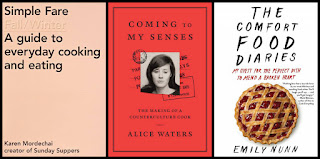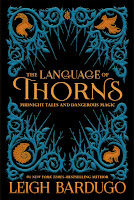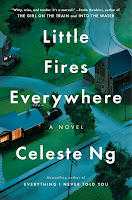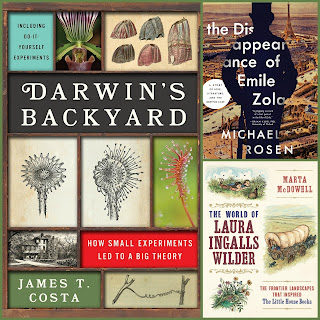 I don't just like to cook and bake, I like knowing the hows and whys of creating successful dishes. I've owned and read a few books that delve into the mysteries of culinary chemistry over the years, but none was as fun and accessible as Dr. Stuart Farrimond's The Science of Cooking: Every Question Answered to Perfect Your Cooking (thanks to the publicist for a review copy).
I don't just like to cook and bake, I like knowing the hows and whys of creating successful dishes. I've owned and read a few books that delve into the mysteries of culinary chemistry over the years, but none was as fun and accessible as Dr. Stuart Farrimond's The Science of Cooking: Every Question Answered to Perfect Your Cooking (thanks to the publicist for a review copy).
The book is published by DK (out on September 19), so you know it's going to be a joy to read, with fantastic photos and great graphics. The Science of Cooking consists of page after page of cool kitchen stuff (note my sophisticated language). I can't get enough of this book.
One of Farrimond's goals was to separate cooking lore and culinary folk beliefs from the actual science of cooking by answering 160 kitchen questions and explaining everything from how many times it's safe to reheat rice to the physics behind various cooking methods. You might think the information would be dry and scholarly, but you would be wrong. Check out the following spread, which tells us all about steaming:

Besides cooking techniques,
The Science of Cooking includes "myth buster" features, which reveal the truth behind common kitchen wisdom, such as never opening the oven door when baking a cake (in some cases it's okay). The "in focus" features concentrate on a specific ingredient, like eggs, four, and chocolate. Other sections explain things you've always wondered about--for example, why saffron is expensive (see scan; click to enlarge), the difference between wild salmon and farm-raised salmon, and how to get the most flavor out of your spices. (Proper storage plays a big role.)
 The Science of Cooking
The Science of Cooking covers how to buy kitchen equipment and ingredients, why different techniques work, what happens when you whip eggs, how to make the perfect rice, why gluten-free bread doesn't rise as high as wheat bread, and how to tell if your steak is ready to come off the grill.
This is the kind of book you'll want to flip through a little at a time. Curious about cooking fish in parchment? Farrimond has you covered (ha!). Want to know why different colored bell peppers taste different? Read about it here. (Sugar content is part of the story.) There is so much information packed into these pages, it's impossible for me to tell you everything. Although I've gone through the entire book, there are plenty of sections I want to study more closely. From meat to dairy, from veggies to chocolate,
The Science of Cooking has the inside scoop.
If you're curious about what goes on in your kitchen, then you'll love Stuart Farrimond's
The Science of Cooking. The book is a great addition to any cookbook collection and would make a fabulous present. Buy or borrow
The Science of Cooking, pour your favorite beverage, and settle in for hours of informative entertainment. You'll be a more savvy cook and may even up your trivia scores.
Here's a quote I won't soon forget:
To your brain, physical burning and chile heat are identical sensations.
Yikes! (Tip: According to Farrimond, grab some dairy or mint to cool down your mouth.)
Note: The scans were used in the context of this review; all rights remain with the original copyright holders.
NOTE: Mr. Linky sometimes is mean and will give you an error message. He's usually wrong and your link went through just fine the first time. Grrrr.
_______
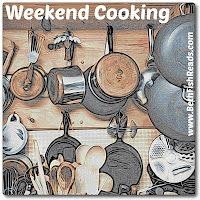 Weekend Cooking
Weekend Cooking is open to anyone who has any kind of food-related post to share: Book reviews (novel, nonfiction), cookbook reviews, movie reviews, recipes, random thoughts, gadgets, quotations, photographs, restaurant reviews, travel information, or fun food facts. If your post is even vaguely foodie, feel free to grab the button and link up anytime over the weekend.
You do not have to post on the weekend. Please link to your specific post, not your blog's home page.
_______
Click for more

4 whole cinnamon sticks
 Weekend Cooking is open to anyone who has any kind of food-related post to share: Book reviews (novel, nonfiction), cookbook reviews, movie reviews, recipes, random thoughts, gadgets, quotations, photographs, restaurant reviews, travel information, or fun food facts. If your post is even vaguely foodie, feel free to grab the button and link up anytime over the weekend. You do not have to post on the weekend. Please link to your specific post, not your blog's home page.
Weekend Cooking is open to anyone who has any kind of food-related post to share: Book reviews (novel, nonfiction), cookbook reviews, movie reviews, recipes, random thoughts, gadgets, quotations, photographs, restaurant reviews, travel information, or fun food facts. If your post is even vaguely foodie, feel free to grab the button and link up anytime over the weekend. You do not have to post on the weekend. Please link to your specific post, not your blog's home page.










